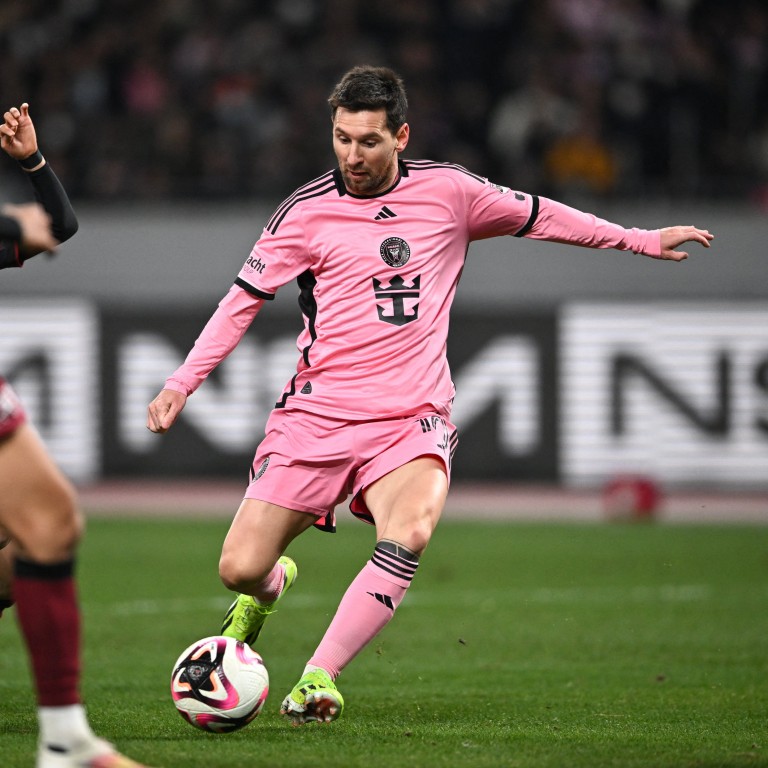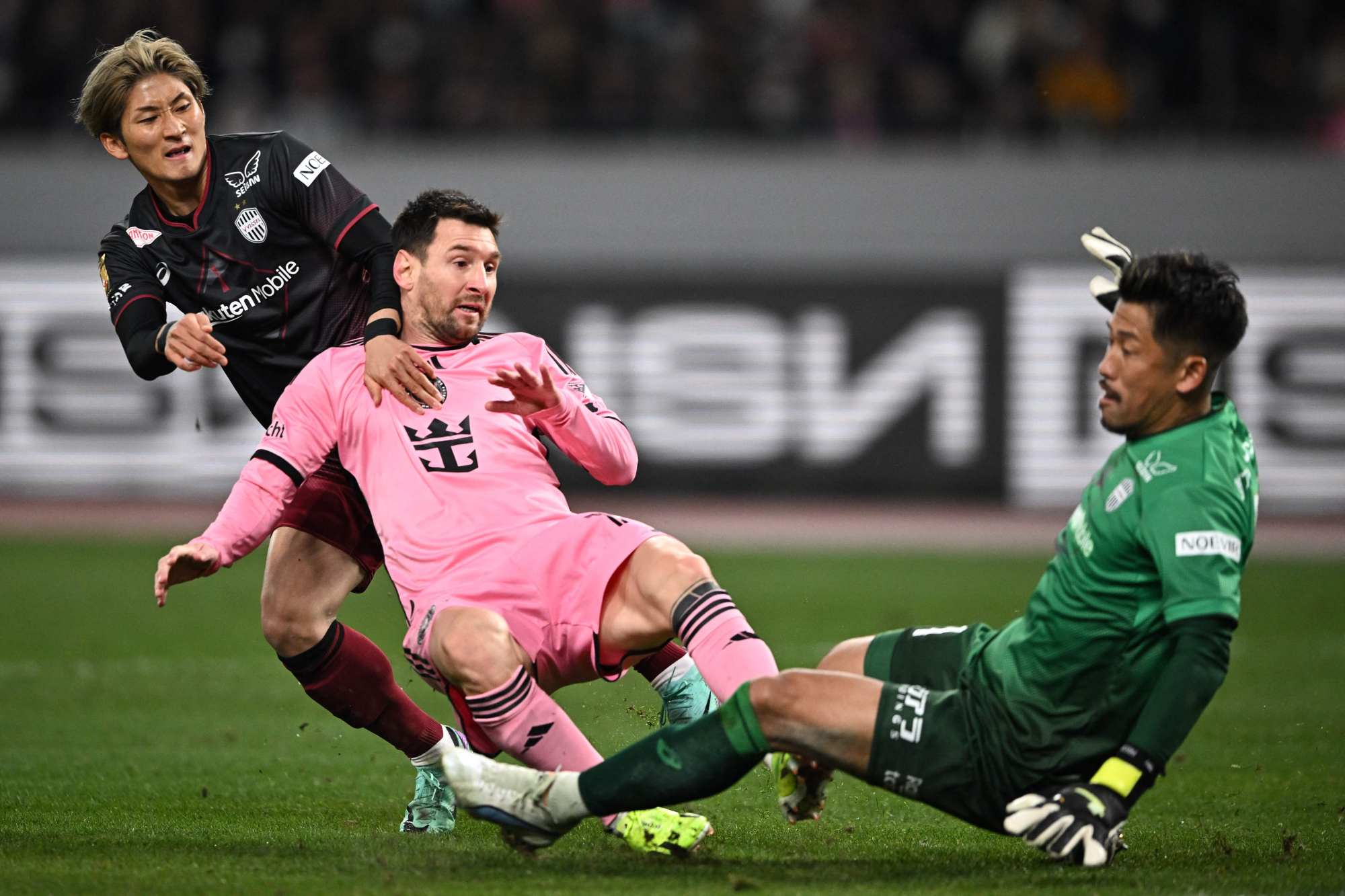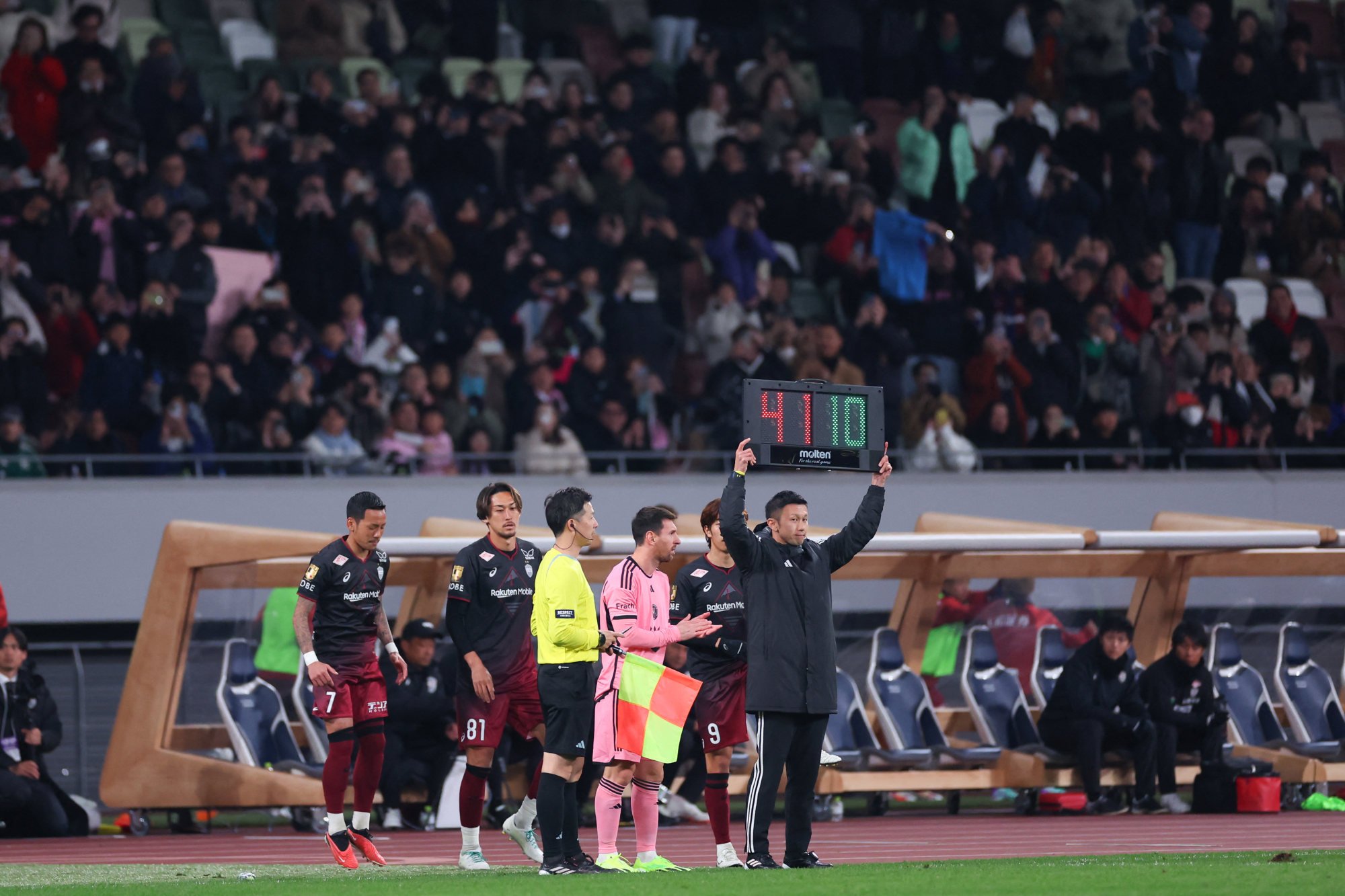
Lionel Messi plays in Japan just 3 days after injury rules him out of US$7 million visit to Hong Kong, adds fuel to fans’ anger
- Messi comes on in 60th minute at National Stadium in Tokyo, as Inter Miami lose 4-3 on penalties after goalless 90 minutes
- Government says Hongkongers deserve explanation, as it emerges organisers paid almost US$7 million for star and Inter Miami teammates to visit city
Argentinian football star Lionel Messi played the final 30 minutes of his Inter Miami team’s game against Vissel Kobe in Japan on Wednesday, the sharp contrast further fuelling the anger of fans in Hong Kong where he sat out his game just three days ago citing an injury and left the city outraged.
He missed Sunday’s encounter at Hong Kong Stadium with his coach Gerardo Martino and club, with a bruised thigh keeping him out of the action. Miami also opted to rest Luis Suarez, although gave no reason for doing so.
But barely 72 hours later, the pair were seen fighting fit running around the National Stadium in Tokyo, with Suarez, Jordi Alba and Sergio Busquets all starting the Major League Soccer club’s final preseason game in Asia.
And in contrast to the 38,323 spectators that packed into Hong Kong Stadium on Sunday, there were banks of empty seats at the ground in Tokyo and only 28,614 seats at the 80,000 venue were sold.
The Culture, Sports and Tourism Bureau said Hongkongers would be “baffled by this”, and said the city’s residents deserved “a reasonable explanation”.
“The coach of Inter Miami said Messi could not play in Hong Kong because of an injury, but he looked fine in the match in Japan, and was running around for a decent amount of time,” the bureau said in an emailed response to the Post.
The Hong Kong government has already demanded answers from the organisers, Tatler Asia, who – sources told the Post – had paid Inter Miami “almost US$7 million” to have the club visit the city.

Sports sector lawmaker Kenneth Fok Kai-kong said he “could not let the matter just slide” and that it had harmed Hong Kong’s image.
“I don’t want to comment too much on [Inter Miami’s] performance and arrangements in Japan, but there is no doubt this is rubbing salt into the wound of fans in Hong Kong,” Fok said in a Facebook post.
“It is saddening to see him playing now and looking back to the disappointment of the 40,000 fans at the stadium while Messi scowled and turned down photo ops.”
Even before Messi stepped onto the field, angry reactions bubbled over on social media in Hong Kong when he was named among the substitutes, with an online forum user saying Inter Miami were clearly “disregarding Hong Kong fans”.
While several others adopted a lighter tone, and said it showed the city was, “a good place [for Messi] to recover from injuries”, the discontent was not limited to Hong Kong.
And there could be repercussions for Argentina’s trip to mainland China next month, when they are expected to play friendlies against the Ivory Coast and Nigeria, in Hangzhou and Beijing.
Chinese netizens on Xiaohongshu, the country’s answer to Instagram, and Weibo, the mainland’s version of X, called for the games to be cancelled.
“It was a medical miracle that he recovered instantly as he arrived in Japan,” a Xiaohongshu user said. “It’s hard to imagine that in 2024 there are still people so blatantly discriminating against the Chinese while making money here.”
Not everyone took offence, and a Weibo user said suggesting a PR misstep was an example of them “hating China while preferring Japan … was stupid, meaningless and ill-intended”.
Messi and his club did their best to apologise, although a statement on a Weibo account attributed to the diminutive forward brought its own chorus of disapproval.
Sent little more than an hour before kick-off in Tokyo, it was posted by someone in Sichuan, a province on the Chinese mainland, and largely reiterated remarks he had made in a press conference on Tuesday.
“Friends who know me will know that I want to give my best in every game, especially when I come from a long way with my teammates,” the post said.
“It’s hoped that we can come back one day, and give our best to the match for the fans in Hong Kong.”
In an email to the Post, Inter Miami apologised and said they had “tried everything possible” to get him to play, adding they hoped fans in Hong Kong would welcome them back one day.
Much like in Hong Kong, Messi spent the first half in Tokyo on the bench, but this time he wore football boots and looked raring to go.
He replaced David Ruiz in the 60th minute to roars of approval from the crowd, but the Japanese fans had already seen more action from the 36-year-old before the game started than their Hong Kong counterparts did over two days, with Messi running around the pitch as his team warmed up.

And Messi came closest to scoring for Miami in normal time, forcing Kobe goalkeeper Shota Arai into a smart save and then making defender Ryo Hatsuse clear the rebound off the line. Goalless after 90 minutes, Arai starred in the penalty shoot-out as his side won 4-3.
The forward’s absence in Hong Kong caused a row that has rumbled on ever since, and has prompted demands for refunds. Some 825 complaints, totalling HK$5.59 million (US$715,000), have been made to the city’s Consumer Council.
With fans travelling from across the region to attend the game, the council said the highest amount involved in a single case was HK$82,960, while the average amount from each complaint was HK$6,776.
Lau Siu-kai, a consultant from the semi-official Chinese Association of Hong Kong and Macau Studies think tank, said the difference in Messi’s behaviour had sparked conversations over whether he had been influenced by political considerations.
Lau questioned whether the footballer had been keen not to upset the United States, so had avoided certain officials, such as Chief Executive John Lee Ka-chiu, because of the sanctions the country had imposed.
“Hongkongers are feeling humiliated,” he said. “Some individuals may be inclined to believe the possible involvement of foreign forces, because surely it’s not possible for a football team aiming to make a name to overlook the substantial market in China.”




